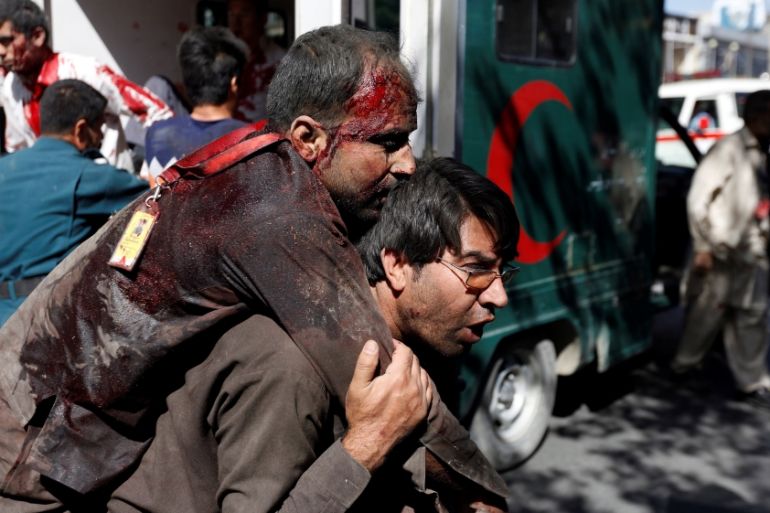Afghanistan: Deadly Kabul truck-bomb toll rises
President Ashraf Ghani confirms upward revision, making May 31 blast deadliest single attack in Afghanistan in 16 years.

At least 150 people were killed in a massive truck-bomb explosion in Kabul on May 31, President Ashraf Ghani said, an upward revision making it deadliest single attack to strike Afghanistan since the US-led invasion of 2001 to topple the Taliban.
The Afghan leader told an international peace conference in the capital on Tuesday that the attack, which took place at a highly fortified area of the capital, targeted “the entire diplomatic community”.
“We were not the only targets, the entire diplomatic community was the target of this attack,” Ghani told foreign diplomats gathered for the “Kabul Process”.
Previous official estimates had put the death toll at about 90, with more than 460 wounded.
The May 31 blast at rush hour saw a sewage truck packed with what Ghani called “military-grade” explosives detonate near Zanbaq Square, close to a fortified area including foreign embassies and government buildings.
All of those killed were Afghans.
READ MORE: Fear penetrates Kabul after deadly cycle of violence
Ghani paid specific tribute to the 13 policemen who were killed by the explosion as they attempted to stop the truck.
No group has claimed responsibility for the attack, but the Afghan government has accused the Taliban-allied Haqqani Network.
Two days later, residents took to the streets to demand answers from the government, whom they accused of security and intelligence failures.
Clashes between protesters and security forces broke out, resulting in the deaths of at least five people.
The next day, at least a dozen people were killed when suicide bombers attacked the funeral for one of the dead protesters on Saturday.
Kabul lock down
Much of Kabul remained on lockdown before Tuesday’s conference, with tighter than usual security including more armed checkpoints and armoured vehicles patrolling the streets.
Representatives of 23 countries, including the United States, India and China are attending the meeting, which aims to build international support on ways to restore security in the conflict-torn country.
Pakistan, a country Afghan officials often blame for insecurity, was also in attendance.
Al Jazeera’s Jennifer Glasse, reporting from Kabul, said the government described the meeting as an Afghan-led umbrella peace building process.
READ MORE: Kabul blast – ‘Such attacks will never end’
“We have seen other attempts at peace but most of them haven’t been here in the Afghan capital, most of them have been outside of the country,” Glasse said.
“This is something that the Afghans want to lead. President Ghani says he has already shown part of his strategy by bringing Gulbuddin Hekmatyar, the former strongman who was outside of the country for so long, and thousands of his fighters … to a political process.
“He hopes that would really lay the groundwork for other to come in and join the peace process.”
Once branded as “the butcher of Kabul”, Hekmatyar was accused of killing thousands of people when his Hezb-i-Islami fighters fired on civilian areas of Kabul during the country’s 1992-1996 civil war.
But in February, the UN Security Council lifted sanctions on him, paving the way for his return to Afghanistan.
On his return to Kabul, Hekmatyar called on the Taliban to come to the negotiating table.
Ghani, who invited the Taliban to the negotiating table several times, again asked the Taliban to Tuesday’s conference, calling it their “last chance” to give up their 16-year armed struggle and join the political process.
The Taliban has steadily expanded its reach since US and NATO forces formally concluded their combat mission at the end of 2014 and transitioned to a support and counterterrorism role.
Past attempts at peace talks have failed.
The Taliban has refused to negotiate with the government until all foreign forces leave, and still refers to itself as a government in exile, angering authorities in Kabul.
|
|